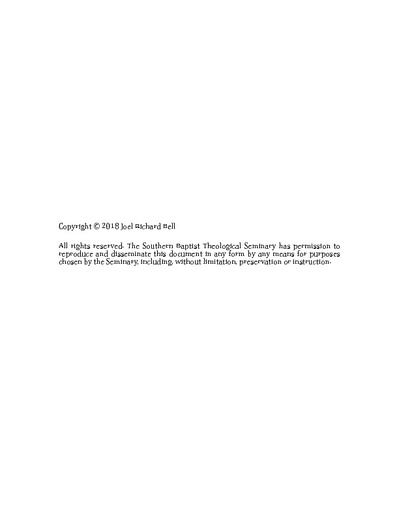| dc.contributor.advisor | Gentry, Peter J. | |
| dc.contributor.author | Bell, Joel | |
| dc.date.accessioned | 2019-06-05T18:31:20Z | |
| dc.date.available | 2019-06-05T18:31:20Z | |
| dc.date.issued | 2018-07-11 | |
| dc.identifier.uri | http://hdl.handle.net/10392/5833 | |
| dc.description.abstract | This thesis investigates three features of Septuagint Leviticus’ Greek text as a means to better understand the translator, his world, and his text. After an introductory chapter, chapter 2 shows that the valency of Hebrew verbs (in this instance qṭr) is an important tool for the analysis of translation technique. In this case, discovering and understanding the deviations by Greek translators in Lev 3:11 and 16a. Chapter 3 provides further analysis of Lev 3:11 and 16a arguing that the translator did most likely deviate from his Hebrew parent text based on religious reasons. When the translator perceived his Hebrew text to imply that God ate food, he either omitted or misrepresented leḥem in his translation. Chapter 4 studies the history of the usage of δικαίωμα. The translator chose δικαίωμα to represent ḥōq “statute,” in LXX-Lev 25:18a, as part of a tradition that would influence the meaning of δικαίωμα in subsequent Jewish and Christian Greek literature and eventually the broader Greek world. In all three studies the translator seemed to be somewhat dependent on, and possibly a part of, a group of Pentateuchal translators. | en_US |
| dc.subject.lcsh | Bible. Leviticus. Greek. Septuagint--Translating | en_US |
| dc.title | Studies in Septuagint Leviticus: Linguistics, Tradition, and Lexical Choice | en_US |
| dc.type | Electronic thesis | en_US |
| dc.type | Text | en_US |
| dc.type.qualificationname | Th.M. | en_US |
| dc.publisher.institution | Southern Baptist Theological Seminary | en_US |
| dc.publisher.department | School of Theology | |

